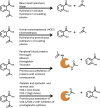Beyond COX-1: the effects of aspirin on platelet biology and potential mechanisms of chemoprevention
- PMID: 28762014
- PMCID: PMC5557878
- DOI: 10.1007/s10555-017-9675-z
Beyond COX-1: the effects of aspirin on platelet biology and potential mechanisms of chemoprevention
Abstract
After more than a century, aspirin remains one of the most commonly used drugs in western medicine. Although mainly used for its anti-thrombotic, anti-pyretic, and analgesic properties, a multitude of clinical studies have provided convincing evidence that regular, low-dose aspirin use dramatically lowers the risk of cancer. These observations coincide with recent studies showing a functional relationship between platelets and tumors, suggesting that aspirin's chemopreventive properties may result, in part, from direct modulation of platelet biology and biochemistry. Here, we present a review of the biochemistry and pharmacology of aspirin with particular emphasis on its cyclooxygenase-dependent and cyclooxygenase-independent effects in platelets. We also correlate the results of proteomic-based studies of aspirin acetylation in eukaryotic cells with recent developments in platelet proteomics to identify non-cyclooxygenase targets of aspirin-mediated acetylation in platelets that may play a role in its chemopreventive mechanism.
Keywords: Acetylome; Aspirin; Chemoprevention; Cyclooxygenase-1; Cyclooxygenase-2; Platelets.
Figures



References
-
- Ishikawa H, Wakabayashi K, Suzuki S, Mutoh M, Hirata K, Nakamura T, Takeyama I, Kawano A, Gondo N, Abe T, Tokudome S, Goto C, Matsuura N, Sakai T. Preventive effects of low-dose aspirin on colorectal adenoma growth in patients with familial adenomatous polyposis. Double-blind randomized clinical trial. Cancer Medicine. 2013;2(1):50–56. doi: 10.1002/cam4.46. - DOI - PMC - PubMed
-
- Burn J, Gerdes AM, Macrae F, Mecklin JP, Moeslein G, Olschwang S, et al. Long-term effect of aspirin on cancer risk in carriers of hereditary colorectal cancer: an analysis from the CAPP2 randomized controlled trial. Lancet. 2011;378(9809):2081–2087. doi: 10.1016/S0140-6736(11)61049-0. - DOI - PMC - PubMed
Publication types
MeSH terms
Substances
Grants and funding
LinkOut - more resources
Full Text Sources
Other Literature Sources
Research Materials

